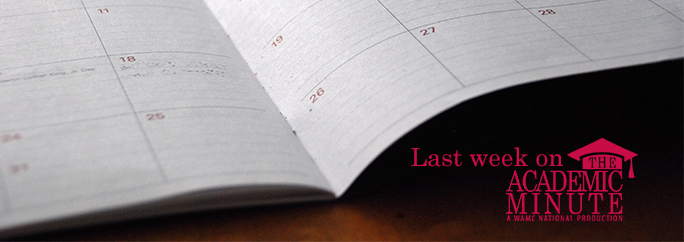
The Academic Minute from 08.16 – 08.20
Monday, August 16th
Bin He – Carnegie Mellon University
Meditation and Mind Control
Bin He is the Trustee Professor of Biomedical Engineering and Professor of Neuroscience at Carnegie Mellon University. Dr. He has made significant research contributions to the field of neuroengineering, including brain-computer interface, functional neuroimaging, and neuromodulation. Dr. He’s research is recognized by a number of awards including the prestigious IEEE Biomedical Engineering Award, the IEEE William J. Molock Award, and the Academic Career Achievement Award from IEEE Engineering in Medicine and Biology Society. He served as a Past President of the IEEE Engineering in Medicine and Biology Society, and presently serves as the Chair of the International Academy of Medical and Biological Engineering. Dr. He also served as Member of the NIH BRAIN Initiative Multi-Council Working Group.
Tuesday, August 17th
Daniel Armanios – Carnegie Mellon University
The Social Legacies of Our Infrastructure Systems
Daniel Armanios is an Assistant Professor in the Department of Engineering and Public Policy at Carnegie Mellon University as well as a Distinguished Visiting Professor of Leadership at Tsinghua University’s Schwarzman College. His research lies at the intersection of institutions, engineering systems, and public policy & entrepreneurship. More specifically, he focuses on the social processes that influence how physical and scientific infrastructure is built and subsequently used to achieve entrepreneurship, innovation, and sustainable development outcomes. His research is conducted in a variety of contexts such as the United States, China, India, Thailand, Egypt, and Tunisia. To those ends, he uses a mixed methods approach that integrates qualitative and quantitative data to overcome constraints that have historically hindered empirical analyses in these settings.
Wednesday, August 18th
Amir Baramati Farimani – Carnegie Mellon University
Outsmarting a Virus
Amir Barati Farimani received his Ph.D. in 2015 in Mechanical Science and Engineering from the University of Illinois at Urbana-Champaign. His Ph.D. thesis was titled “Detecting and Sensing Biological Molecules using Nanopores.” He extensively used atomistic simulations to shed light on the DNA sensing and detection physics of biological and solid state nanopores. Right after that, he joined Professor Vijay Pande’s lab at Stanford. During his post-doc, he combined machine learning and molecular dynamics to elucidate the conformational changes of G-Protein Coupled Receptors (GPCRs). He specifically was focused on Mu-Opioid Receptors to elucidate their free energy landscape and their activation mechanism and pathway.
Thursday, August 19th
Destenie Nock – Carnegie Mellon University
Energy Poverty
Dr. Destenie Nock is a leader in energy justice and equitable energy transitions. In her role as an Assistant Professor in Civil & Environmental Engineering (CEE), and Engineering and Public Policy (EPP) she leads a team of researcher who create optimization and decision analysis tools which evaluate the sustainability, equity, and reliability of power systems in the US and Sub-Saharan Africa. One of her current projects include developing a framework for understanding the sustainability and equity trade-offs for different power plant investments. Another project involves quantifying the air pollution emissions associated with electric transmission and distribution systems.
Friday, August 20th
Larry Pileggi – Carnegie Mellon University
Keeping the Power Grid Safe from Mother Nature and Human Nature
Larry Pileggi is the Tanoto professor and Head of electrical and computer engineering at Carnegie Mellon University. He has received numerous awards for his research work on design automation and integrated circuits, and more recently for his work on modeling, simulating, and optimizing the electric power grid. He and his students have co-founded several companies, including Pearl Street Technologies that is focused on software tools for planning a reliable, resilient, and sustainable grid. He has published almost 400 conference and journal papers and holds 40 U.S. patents. He is a fellow of IEEE.
